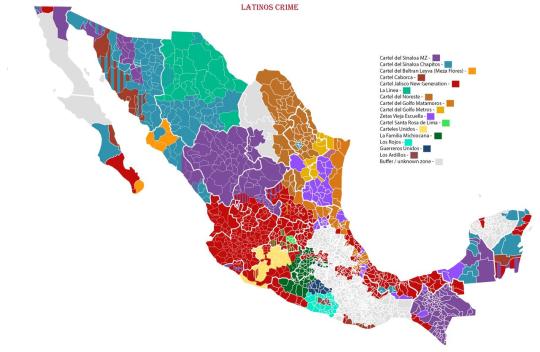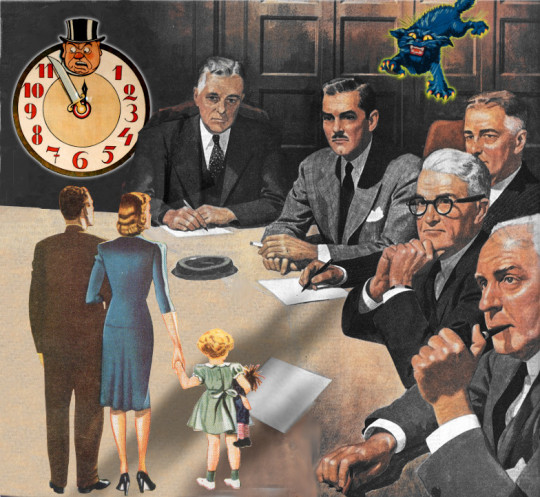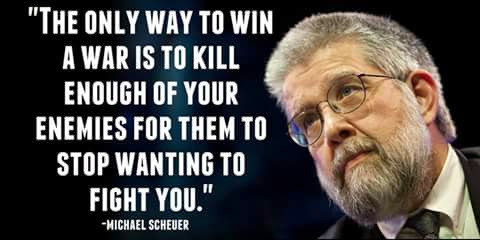#cartels
Photo

Cartel map of Mexico 2024
125 notes
·
View notes
Text
Army personnel guarding a weapons cache that was confiscated from the CDN cartel near the U.S. border, in Nuevo Laredo, Mexico



198 notes
·
View notes
Text
57 notes
·
View notes
Text
The Sinaloa Cartel is reportedly trying to control Mexico's jellyfish trade.
"They [cartel] go into all businesses now they go into all the way down to the local hot dog and taco stand that is opened up by the local couple in their poor town.
They get a quota from there from them. That's the way these cartels are terrorizing the entire country of Mexico..."
#pay attention#educate yourselves#educate yourself#knowledge is power#reeducate yourself#reeducate yourselves#think for yourself#think for yourselves#think about it#question everything#ask yourself questions#cartels
24 notes
·
View notes
Text
You want me to be Homophobic?
The very thing that got all of the major dons of the Juarez Cartel killed by a Chilean Fast Food Owner?
#breaking bad#cartels#mexico#homophobia#canon typical homophobia#canon gay#gay#bisexual#gustavo fring#gus#breaking bad gus#better caul saul#jesse pinkman#breaking bad jesse#hector salamanca#los pollos hermanos#chile#don eladio#jurarez#poison#murder#fast food
42 notes
·
View notes
Link
Call them junk fees, nuisance fees, or sludge, they amount to add-ons to the stated price of something.
Unregulated businesses which have national or local monopolies or who deal in uncompetitive services can mostly charge you whatever they want. Sometimes exorbitant prices are camouflaged by fees billed as add-ons but are usually necessary for the transaction.
In his State of the Union address, President Biden said he would try to crack down on these junk fees.
Hertz charges almost $6 a day simply for using a toll transponder in a rental car. Marriott and Hilton add nightly “resort fees” to the bill even at hotels that nobody would consider to be resorts. American, Delta and United list one airfare when you first search for a seat — and then add charges for basic features like the ability to sit next to your spouse.
Ticketmaster is especially aggressive about imposing fees, as I experienced recently while buying two tickets to a football game. When I initially selected my seats on Ticketmaster’s online stadium map, they cost $48. The bill at checkout was more than one-third higher — $64.40.
President Biden has announced a crackdown on these fees (which his administration calls “junk fees”), and he devoted a section of his State of the Union address to them. “Look, junk fees may not matter to the very wealthy, but they matter to most other folks in homes like the one I grew up in,” he said Tuesday night. “I know how unfair it feels when a company overcharges you and gets away with it.”
Very often consumers don’t pay much attention to the small print written in extended and impenetrable gobbledygook which has become a routine part of many transactions. Did you read the entire text of the terms the last time you purchased or updated software and clicked AGREE?
We lead busy lives that keep us from analyzing every purchase, and we get distracted by salient but misleading information (like a low list price). Big companies, with the resources at their disposal, have learned to take advantage of these limitations. The economist Richard Thaler refers to practices like these as “sludge,” the evil counterpart to nudges that use behavioral economics to improve life.
True, one company could call out another for using sludge. But doing so often requires a complex marketing message that tries to persuade people to overcome their psychological instincts (like the appeal of a low list price). For that reason, Hilton can probably make more money by charging its own sneaky resort fees than by criticizing Marriott’s.
Yep. When competitors don’t call each other out, it may be to hide their own dodgy practices. In such circumstances they are acting more like a cartel than like competing businesses.
One step beyond a cartel is a classic monopoly.
In some markets, consumers don’t have much choice. Ticketmaster’s fees outrage many people. But I didn’t have any choice when I bought those football tickets. There was no rival service selling them.
In recent decades, many American industries have become more concentrated, partly because Washington became more lax about enforcing antitrust laws. Thomas Philippon, an N.Y.U. economist, has estimated that increased corporate concentration costs the typical American household more than $5,000 a year.
There was an orgy of deregulation during the Reagan years with an encore during the first George W. Bush administration. The stated aim of these rounds of deregulation was to get government off the backs of American businesses. What really happened is that they put certain businesses on the backs of American consumers.
Making it difficult to cancel a service is another aspect of this culture of sludge.
The small number of dominant internet providers, for instance, reduces the chances that a new entrant can design a business strategy around undercutting Comcast’s and Verizon’s sneaky fees. Those new entrants don’t exist. Comcast and Verizon have also figured out how to make the cancellation of internet service unpleasant and time-consuming. Airlines — another concentrated industry — use frequent-flier programs in a similar way, effectively punishing customers for switching to a different carrier.
So the Biden administration is trying to alleviate or even put a stop to many of these fees.
The Biden administration is trying to address both causes of sneaky fees. On antitrust, it has adopted a policy more confrontational than that of any other administration in decades. That effort is in its early stages, without many big victories. Still, the administration does seem to be taking corporate concentration seriously.
As for the sludge itself, the administration has already taken steps to restrict a few examples, such as charges for late payments on credit cards. Biden has asked Congress to pass a law with stricter rules for other industries.
The administration’s bigger focus for now is on disclosure — requiring companies to tell consumers up front what the full cost will be. The Transportation Department has proposed such a rule for airlines.
If you’ve been impacted recently by such business practices, this might be a good time to contact the folks who represent you on Capitol Hill and let them know that you demand change. To get rid of some of these dubious fees it may be necessary for Congress to pass legislation.
BONUS TRACK: Over a year ago an SNL sketch featuring Kieran Culkin brilliantly depicted how difficult it is to deal with corporations who wish to retain a stranglehold on your money.
youtube
Kieran should return and do a follow-up on dealing with banks.
#sludge#junk fees#nuisance fees#monopolies#cartels#lack of competition#deregulation#cable companies#isps#ticketmaster#banks#airlines#hotel chains#cracking down on junk fees#richard thaler#thomas philippon#antitrust laws#biden administration#joe biden#kieran culkin
20 notes
·
View notes
Text
The U.S. Demonizes Mexico For Wanting to Protect its Lithium Resouces
And just in time for U.S. politicians and Republicans putting more emphasis on the "war on drugs" and wanting to enter Mexico by force to get "rid off" the cartels. All excuses for invasion, make no mistake.
17 notes
·
View notes
Text
Thankful for class consciousness

On November 27, I'm appearing at the Toronto Metro Reference Library with Facebook whistleblower Frances Haugen.
On November 29, I'm at NYC's Strand Books with my novel The Lost Cause, a solarpunk tale of hope and danger that Rebecca Solnit called "completely delightful."

Before the term "ecology" came along, people didn't know they were on the same side. You care about owls, I care about the ozone layer – what does the destiny of charismatic nocturnal avians have to do with the gaseous composition of the upper atmosphere?
But as James Boyle has written, the term "ecology" welded together a thousand issues into a single movement. When we talk about "looking at our world through a lens," this is what we mean – apply the right analytical lens and a motley assortment of disparate causes becomes a unified, coherent project:
https://scholarship.law.duke.edu/cgi/viewcontent.cgi?article=1013&context=dlj
Unfettered, planet-destroying, worker immiserating corporate power is only possible in the absence of such a lens. Before neoliberalism can destroy our lives, it must first convince us that we are all disconnected. "There is no such thing as society," isn't just an empty slogan: it's a weapon for dismantling the democratically accountable structures that can stand against industrial tyrants.
That's why neoliberalism is so viciously opposed to all kinds of solidarity, why corporate apologists insist that the only elections that matter are the ones where you "vote with your wallet." It's no surprise that the side with the thickest wallets wants to replace ballots with dollars!
Today, at long last, after generations of deadly corporate power-grabs, we are living through an ecology moment where all kind of fights are coalescing into one big fight: the fight to save democracy from oligarchy.
There are many tributaries flowing into this mighty river, but two of the largest are antitrust and labor. Antitrust seeks to ensure that our world is regulated by democratically accountable lawmakers who deliberate in public, rather than shareholder-accountable monopolists who deliberate in smoke-filled rooms. Labor seeks to ensure that contests between profit for the few and prosperity for the many are decided in favor of people, not profit.
This coalition is so powerful that the ruling class has never stopped attacking it. Indeed, the history of US antitrust law can be viewed as a succession of ever-more-insistent laws enacted solely to make it clear to deliberately obtuse judges that competition law is aimed at corporations, not unions:
https://pluralistic.net/2023/04/14/aiming-at-dollars/#not-men
Rising corporate power and declining worker power is bad for all of us. The failure of successive US administrations to block airline mergers led to sky-high prices and a proliferation of "junk fees" that can double the price of a ticket. The monopoly carriers stand to make $118b this year from these fees:
https://www.fastcompany.com/90981005/airlines-fees-118-billion-dark-patterns
The consolidation of the agricultural sector led to cartels that conspired to rig the prices of our food. These Les Mis LARPers rigged the price of bread!
https://www.cbc.ca/news/business/canada-bread-price-fixing-1.6883783
Remember eggflation? Nearly all the eggs in US grocery stores come from a single company, Cal-Maine, which owns dozens of brands, including "Farmhouse Eggs, Sunups, Sunny Meadow, Egg-Land’s Best and Land O’ Lakes eggs":
https://www.cnn.com/2023/01/13/business/egg-prices-cal-maine-foods/index.html
With all our eggs in one basket, it was easy for a single company to rig the egg market, blaming everything from bird flu to Russian invasion of Ukraine for doubling egg prices while their profits shot up by 65%:
https://pluralistic.net/2023/01/23/cant-make-an-omelet/#keep-calm-and-crack-on
Antitrust isn't just about monopoly – it's also about oligopoly. The American meat cartel pretends that it's not rigging markets by outsourcing its price-fixing to a "clearinghouse" called Agri Stats:
https://pluralistic.net/2023/10/04/dont-let-your-meat-loaf/#meaty-beaty-big-and-bouncy
Agri-Stats gets data from all the Big Meat companies, "anonymizes" it, and publishes it back to its subscribers, who use the service to coordinate across-the-board price-hikes that have cost the public billions in price gouging (meanwhile, Big Meat was able to secure $50b in public subsidies).
For forty years, governments have ceded power to "autocrats of trade" who usurped control "over the production, transportation, and sale of the necessaries of life":
https://pluralistic.net/2022/02/20/we-should-not-endure-a-king/
But that era is coming to an end. In the past year, American regulators have blocked airline mergers and promulgated rules banning junk fees. They've dragged price-fixing clearinghouses into court:
https://www.thebignewsletter.com/p/why-turkey-eggs-and-air-travel-just
They're getting results, too: for the second year in a row, turkey prices are down. Cranberries, too (18%). Same for whipping cream (25%). Pie crusts are down. So are russet potatoes. Airfares are down 13.2%.
The egg cartel just lost a long-running court case over the last egg price-fixing campaign, which gouged Americans from 1990-2008:
https://www.pymnts.com/cpi_posts/kellogg-kraft-secure-victory-in-price-fixing-lawsuit-against-egg-producers
The same fact-pattern that was revealed in that court case is repeated in this year's eggflation scandal:
https://farmaction.us/wp-content/uploads/2023/01/Farm-Action-Letter-to-FTC-Chair-Lina-Khan.pdf
That's terrific ammo for the FTC, and will doubtless benefit the Democrats running against would-be Indiana senator John Rust, whose family owns convicted egg cartel member Rose Acre Farms and whose wife just stepped down as chair of the board.
One underappreciated aspect of the global war on corporate power is that the same corporations commit the same crimes in countries all over the world, which means that whenever any government establishes evidence of those crimes, they are of use to all the other governments. Competition enforcers from the UK, EU, USA, Singapore, South Korea and elsewhere are coordinating to target the Big Tech cartel. Maybe Google and Facebook and Apple are bigger enough to resist any one of those governments – but all of them?
https://cmadataconference.co.uk/
One notable absence from the anti-monopoly coalition is Canada. While other countries merely stopped enforcing their competition laws in the neoliberal era, Canada never had a good competition law to enforce. Canada's official tolerance for monopolies has allowed a handful of companies to seize control over the economy of Canada and the lives of Canadians:
https://www.canadaland.com/shows/commons-monopoly/
These monopolies are largely controlled by powerful families, Canada's de facto aristocracy, whose wealth and power make them above the law and subordinate the country's democratic institutions to billionaires' whims:
https://www.canadaland.com/tag/dynasties/
At long last, Canada has called time on oligarchy. Last week's Fall Economic Statement included an announcement of a muscular new competition law, including new merger guidelines, a new "abuse of dominance" standard, and Right to Repair rules:
https://www.linkedin.com/feed/update/urn:li:activity:7132855021548769282/
The law also includes interoperability mandates for Canada's highly concentrated – and deeply corrupt – banking sector. These measures are strikingly similar to new measures just introduced in the US by the CFPB:
https://pluralistic.net/2023/10/21/let-my-dollars-go/#personal-financial-data-rights
The arrival of Canada's first fit-for-purpose competition rule coincides with all kinds of solidaristic movements in Canada that are fighting corporate power from the bottom up. Even Ontario, led by one of the most corrupt premiers in provincial history, can't break its teachers' union:
https://globalnews.ca/news/10105600/ontario-elementary-teachers-reach-contract-deal/
It's not just workers who benefit from solidarity: Tenants' unions have formed across the province in response to corporate takeovers of scarce rental stock. These finance-sector landlords have armies of lawyers who've figured out how to bypass rent-control rules and evict tenants who balk. Rather than rolling over, tenants' unions are organizing waves of rent-strikes:
https://macleans.ca/longforms/rent-strikes-canada/
As with Big Tech, the illegal tactics of the rental sector aren't confined to a single nation. In America, Wall Street landlords have dramatically increased the price of housing and kicked off an eviction epidemic the likes of which the country has never seen:
https://pluralistic.net/2023/05/16/mortgages-are-rent-control/#housing-is-a-human-right-not-an-asset
And as with Big Meat, landlords use arm's-length clearing houses to rig rental markets, coordinating across-the-board rent hikes:
https://www.propublica.org/article/yieldstar-rent-increase-realpage-rent
In other words: to fix the housing market, tenants all over the world need to learn the tactics of labor unions. Housing regulators have to learn from agricultural regulators. Americans tenants have to learn from Canadians. These aren't 1,000 different fights – they're one big fight, and the coalition for dismantling corporate power is vast and powerful.
The most powerful weapons our bosses have is convincing us that we are weak and they are strong – so strong that we shouldn't even try to fight them. But solidarity is absurdly powerful, which is why they go to such great lengths to discredit it. In Sweden, the solidarity strikes against Tesla – who refuses to recognize its maintenance workers' union – have spread to nine unions.
Tesla can't get its cars offloaded at the ports. It can't get its showrooms cleaned. No one will deliver its mail. No one will fix its chargers. The strike is spreading to Germany, and workers at its giant Berlin factory is set to walk out:
https://www.metafilter.com/201514/Swedish-Tesla-workers-go-on-strike
There's something delicious about how palpably frustrated Elon Musk is by all this, as he realizes that neither his billions nor his bully pulpit are a match for workers in solidarity:
https://www.bloomberg.com/news/articles/2023-11-23/elon-musk-calls-swedish-tesla-strikes-insane-as-impact-spreads
It's a reminder of just how fragile and weak billionaires are, when we stop believing in them and deferring to them. Rebecca Solnit's latest Guardian column adds up the ways that allowing billionaires to run the show puts us all in danger:
https://www.theguardian.com/commentisfree/2023/nov/20/billionaires-great-carbon-divide-planet-climate-crisis
They are the unelected "autocrats of trade" who control "the production, transportation, and sale of the necessaries of life." They are the force that this new ecology movement is coalescing to fight: across borders, across sectors, across identities. No matter whether you are a worker, a tenant, a voter, a shopper or a citizen, your enemy is the billionaire class.

If you'd like an essay-formatted version of this post to read or share, here's a link to it on pluralistic.net, my surveillance-free, ad-free, tracker-free blog:
https://pluralistic.net/2023/11/24/coalescence/#solidarnosc
#pluralistic#james boyle#ecology#corporate power#monopoly#monopolism#eggflation#euthanizing rentiers#money beats ethics#incentives matter#sam altman#open ai#junk fees#cartels#aviation#billionaires#rebecca solnit#price fixing#Rent strike#canada#canpoli#toronto#the rents too damned high#weaponized shelter#tenants union#unions#tesla#sweden#labor#moral injury
100 notes
·
View notes
Note
Peeps on this brainless clownsite will see the Writers' Guild of America say plainly "even if you are a non-member and therefore we will NOT offer you benefit or protection, should you accept any kind of writing work from *our* industry while *we're* striking, we will refuse you future membership" and act like this is so admirable and #valid instead of the most blatant act of cartel-ism that shows who the beneficiaries of these supposed workers' organizations actually are.
This is not a question, and I'm not sure why you're sending it to me. I'll pretend it's a guest post submission, I suppose.
7 notes
·
View notes
Text
Villagers in Mexico were fed up with cartel extorting money and decided to attack the criminals.
At least 8 cartel members and 3 villagers were killed in the confrontation (Texcaltitlán, 8th of December)
117 notes
·
View notes
Text

Close the borders
1 note
·
View note
Note
What does programming look like for a cartel, and for a gang? (Seperate)
Gangs typically don’t use programming, they use indoctrination methods. Cartels use family ties and high control methods.
Oz
3 notes
·
View notes
Text
Wtf do we even have the UN for? Do they do anything? They're not roy helping with Ukraine or Iran or Mexico — what do they do? Write documents they don't follow?
13 notes
·
View notes